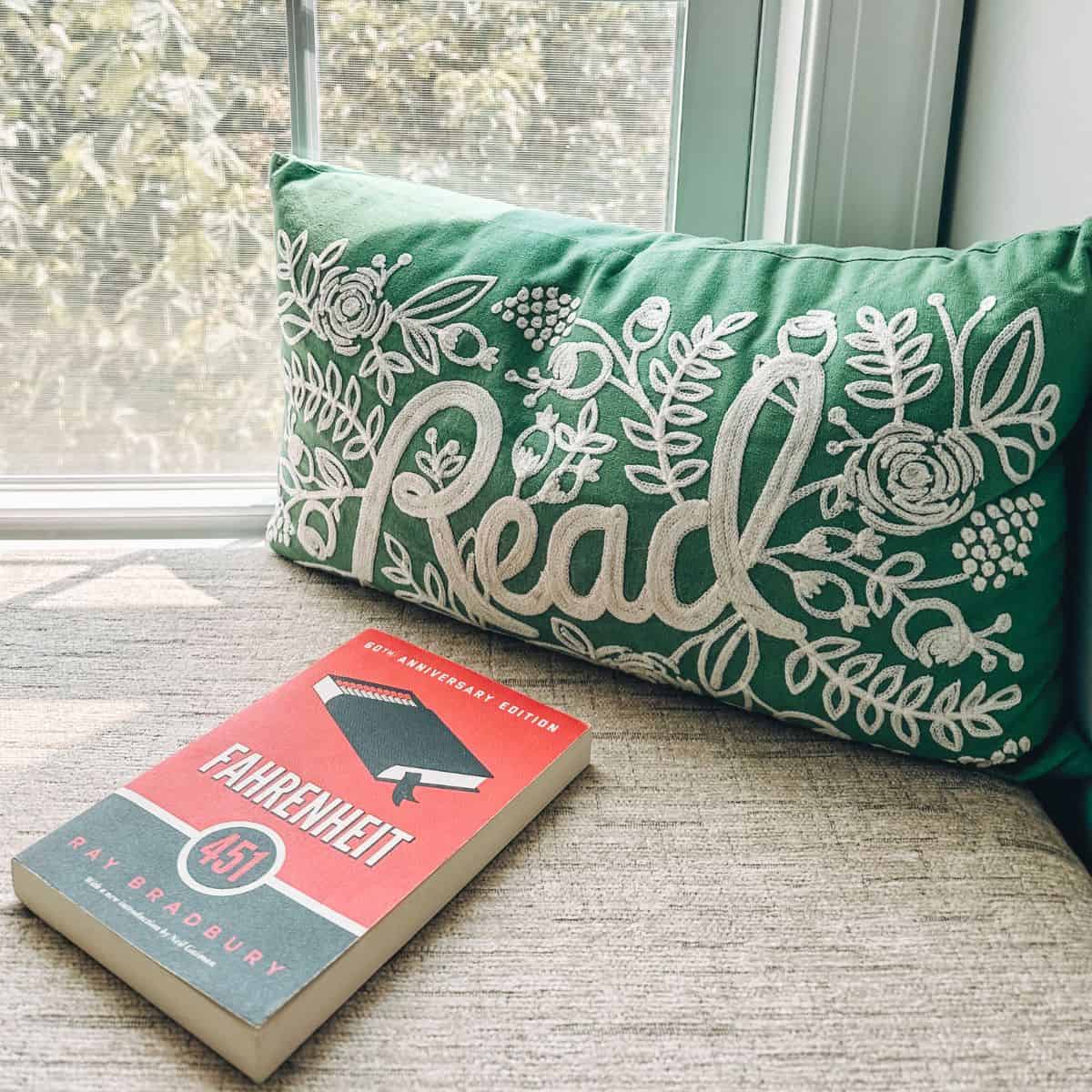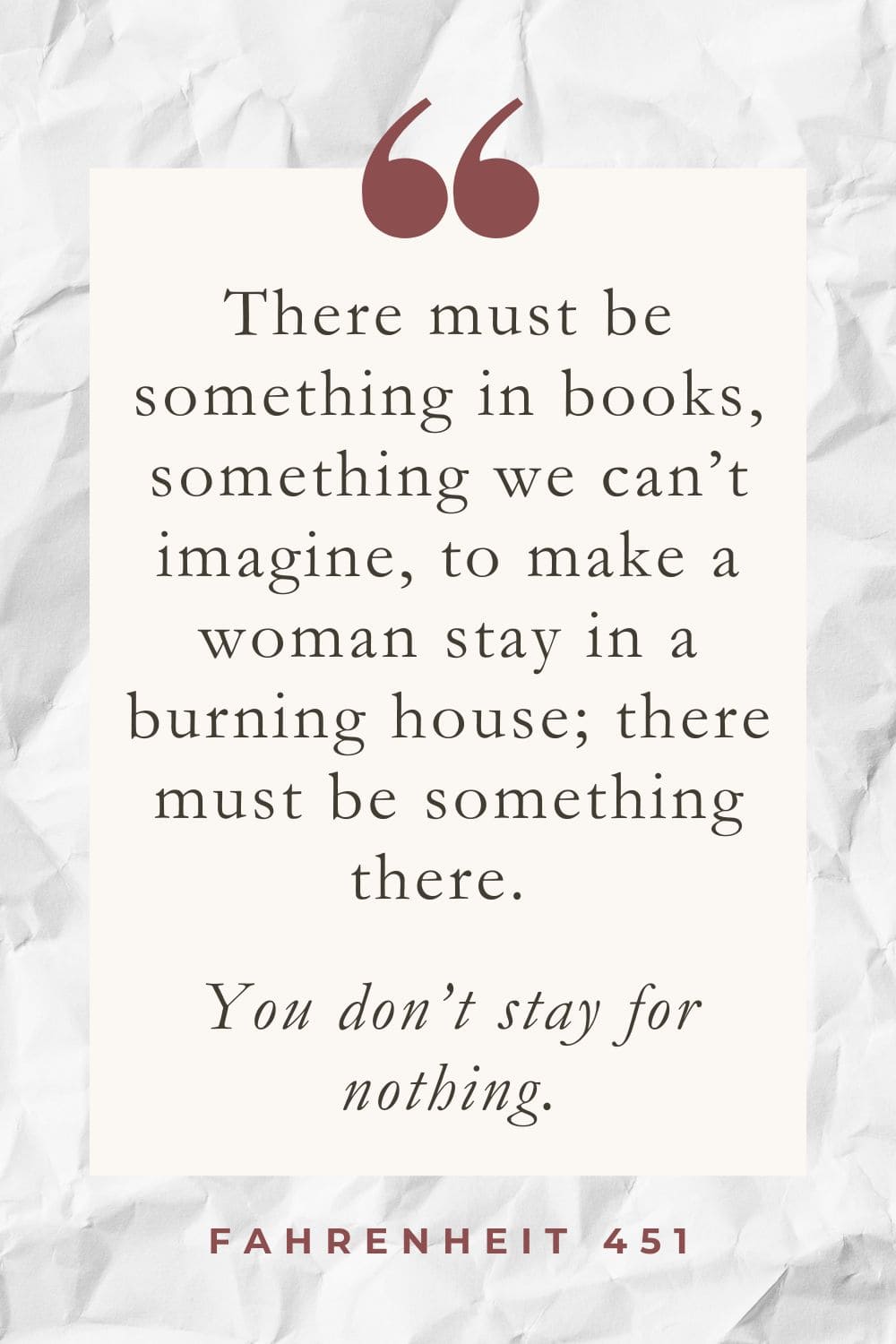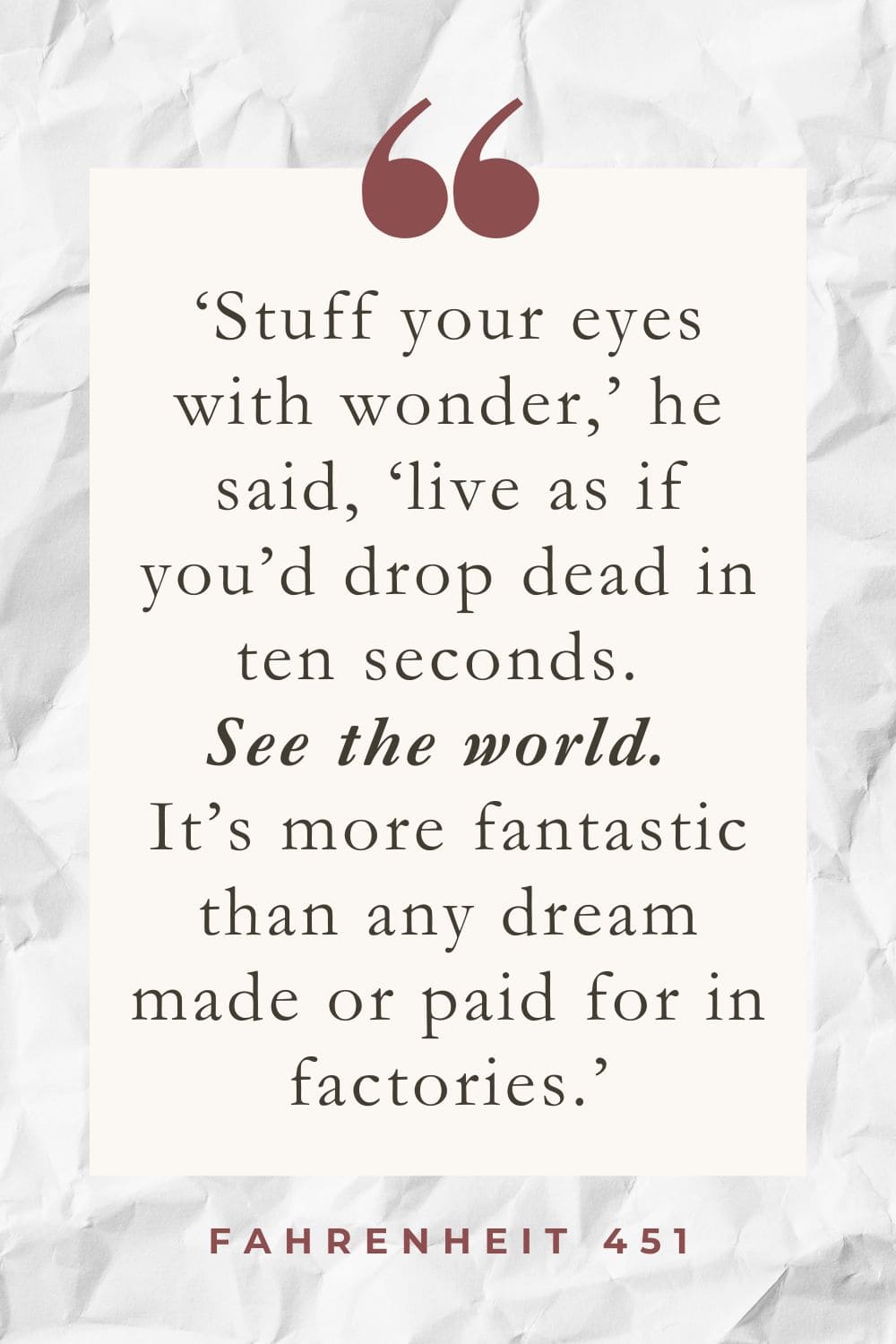Read all the most important Fahrenheit 451 quotes by Ray Bradbury. These quotes make statements about books, censorship, technology, Mildred Montag, Clarisse McClelan, society, knowledge, government, and more. You’ll learn the power of reading and the dangers of disallowing it, and you’ll easily be able to reshare these words. Let’s get literary!

The Best Fahrenheit 451 Quotes on Banned Books and More
These quotes highlight the most prominent themes and topics examined in the novel in brief snippets. These classic book quotes are also offered to provoke thought and inspire dialogue about the depth of this culturally significant text.
First, the most important quote by Guy Montag in Fahrenheit 451: “It was a pleasure to burn.” This famous opening line shows the protagonist Montag’s initial enthusiasm for destruction and sets the stage for his transformation and quest for knowledge.
Read More: Review of Fahrenheit 451 | Summary of Fahrenheit 451

Below are more important Fahrenheit 451 quotes about:
- technology
- censorship
- Mildred
- Clarisse
- books
- society
- government control
- and more
About Technology
“‘That’s sad [that the mechanical hound doesn’t think anything we don’t want it to think]’, said Montag, quietly, ‘because all we put into it is hunting and finding and killing. What a shame if that’s all it can ever know.'” (page 40)
“Speed up the film, Montag, quick. Click, Pic, Look, Eye, Now, Flick, Here, There, Swift, Pace, Up, Down, In, Out, Why, How, Who, What, Where, Eh? Uh! Bang! Smack! Wallop, Bing, Bong, Boom! Digest-digests, digest-digest-digests. Politics? One column, two sentences, a headline! Then, in mid-air, all vanishes!” (page 70)
“Life is immediate, the job counts, pleasure lies all about after work. Why learn anything save pressing buttons, pulling switches, fitting nuts and bolts?” (page 70)
“But time to think? If you’re not driving a hundred miles an hour, at a clip where you can’t think of anything else but the danger, then you’re playing some game or sitting in some room where you can’t argue with the four wall televisor. Why? The televisor is ‘real.’ It is immediate, it has dimension. It tells you what to think and blasts it in. It must be, right. It seems so right. It rushes you on so quickly to its own conclusions your mind hasn’t time to protest, ‘What nonsense!'” (page 97)
About Censorship
“[Firemen] were given a new job, as custodians of our peace of mind, the focus of our understandable and rightful dread of being inferior; official censors, judges, and executors.” (page 73)
“We stand against the small tide of those who want to make everyone unhappy with conflicting theory and thought.” (page 76)
“My uncle says the architects got rid of the front porches because they didn’t look well. But my uncle says that was merely rationalizing it; the real reason, hidden underneath, might be they didn’t want people sitting like that, doing nothing, rocking, talking; that was the wrong kind of social life. People talked too much. And they had time to think.” (page 78)
About Mildred
“His wife stretched on the bed, uncovered and cold, like a body displayed on the lid of a tomb, her eyes fixed to the ceiling by invisible threads of steel, immovable. And in her ears the little Seashells, the thimble radios tamped tight, and an electronic ocean of sound, of music and talk and music and talk coming in, coming in on the shore of her unsleeping mind. The room was indeed empty.” (page 24)
“She laughed an odd little laugh that went up and up. ‘Funny, how funny, not to remember where or when you met your husband or wife.'” (page 56)
“No matter when he came in, the walls were always talking to Mildred.” (page 58)
“She’s nothing to me; she shouldn’t have had books.” (page 65)
“Nobody listens any more. I can’t talk to the walls because they’re yelling at me. I can’t talk to my wife; she listens to the walls. I just want someone to hear what I have to say. And maybe if I talk long enough, it’ll make sense. And I want you to teach me to understand what I read.” (page 95)
About/By Clarisse
“The autumn leaves blew over the moonlit pavement in such a way as to make the girl who was moving there seem fixed to a sliding walk, letting the motion of the wind and the leaves carry her forward.” (page 17)
“Her face, turned to him now, was fragile milk crystal with a soft and constant light in it. It was not the hysterical light of electricity but-what? But the strangely comfortable and rare and gently flattering light of the candle.” (page 19)
“He was not happy. He was not happy. He said the words to himself. He recognized this as the true state of affairs. He wore his happiness like a mask and the girl had run off across the lawn with the mask and there was no way of going to knock on her door and ask for it back.” (page 23)
“‘Why is it,’ he said, one time, at the subway entrance, ‘I feel I’ve known you so many years?’ ‘Because I like you,’ she said, ‘and I don’t want anything from you.'” (page 41)
“She didn’t want to know how a thing was done, but why. That can be embarrassing.” (page 75)
“But Clarisse’s favorite subject wasn’t herself. It was everyone else, and me. She was the first person in a good many years I’ve really liked. She was the first person I can remember who looked straight at me as if I counted.” (page 85)
“I don’t want to change sides and just be told what to do.” (page 106)
About Books and Books Being Banned
“You can’t ever have my books.” (page 51)
“There must be something in books, something we can’t imagine, to make a woman stay in a burning house; there must be something there. You don’t stay for nothing.” (page 65)
“Last night I thought about all the kerosene I’ve used in the past ten years. And I thought about books. And for the first time I realized that a man was behind each one of the books. A man had to think them up. A man had to take a long time to put them down on paper. […] It took some man a lifetime maybe to put some of his thoughts down, looking around at the world and life, and then I come along in two minutes and boom! It’s all over.” (page 66)
“More cartoons in books. More pictures. The mind drinks less and less.” (page 71-72)
“A book is a loaded gun in the house next door. Burn it. Take the shot from the weapon.” (page 73)
“Colored people don’t like Little Black Sambo. Burn it. White people don’t feel good about Uncle Tom’s Cabin. Burn it. Someone’s written a book on tobacco and cancer of the lungs? The cigarette people are weeping? Burn the book.” (page 74)
“We have everything we need to be happy, but we aren’t happy. Something’s missing. I looked around. The only thing I positively knew was gone was the books I’d burned in ten or twelve years. So I thought books might help.” (page 95)
“There is nothing magical in them at all. The magic is only in what books say, how they stitched the patches of the universe together into one garment for us.” (page 96)
“So now do you see why books are hated and feared? They show the pores in the face of life. The comfortable people want only wax moon faces, poreless, hairless, expressionless.” (page 96)
“The things you’re looking for, Montag, are in the world, but the only way the average chap will ever see ninety-nine percent of them is in a book.” (page 99)
“Remember, the firemen are rarely necessary. The public itself stopped reading of its own accord.” (page 100)
“We’ll pass the books on to our children, by word of mouth, and let our children wait, in turn, on the other people. A lot will be lost that way, of course. But you can’t make people listen. They have to come round in their own time, wondering what happened and why the world blew up under them. It can’t last.” (page 168)
“Don’t judge a book by its cover[.]” (page 170)
About Society
“No one has time any more for anyone else.” (page 36)
“With school turning out more runners, jumpers, racers, tinkerers, grabbers, snatchers, fliers, and swimmers instead of examiners, critics, knowers, and imaginative creators, the word ‘intellectual,’ of course, became the swear word it deserved to be.” (page 73)
“Our civilization is flinging itself to pieces. Stand back from the centrifuge.” (page 101)
“There are too many of us, he thought. There are billions of us and that’s too many. Nobody knows anyone. Strangers come and violate you. Strangers come and cut your heart out. Strangers come and take your blood. Good God, who were those men? I never saw them before in my life!” (page 28)
About Knowledge
“If you read fast and read all, maybe some of the sand will stay in the sieve.” (page 91)
“They say you retain knowledge even when you’re sleeping, if someone whispers in your ear.” (page 106-107)
“All we want to do is keep the knowledge we think we will need, intact and safe. We’re not out to incite or anger anyone yet. For if we are destroyed, the knowledge is dead, perhaps for good.” (page 167)
About Government Control
“We must all be alike. Not everyone born free and equal, as the Constitution says, but everyone made equal. Each man the image of every other; then all are happy, for there are no mountains to make them cower, to judge themselves against.” (page 73)
“If you don’t want a house built, hide the nails and wood. If you don’t want a man unhappy politically, don’t give him two sides to a question to worry him; give him one. Better yet, give him none.” (page 75)
“But remember that the Captain belongs to the most dangerous enemy to truth and freedom, the solid unmoving cattle of the majority. Oh, God, the terrible tyranny of the majority.” (page 123)
More Important Quotes
“I’m antisocial, they say. I don’t mix. It’s so strange. I’m very social indeed. It all depends on what you mean by social, doesn’t it?” (page 42)
“We need not to be let alone. We need to be really bothered once in a while. How long is it since you were really bothered? About something important, about something real?” (page 66)
“Happiness is important. Fun is everything. And yet I kept sitting there saying to myself, I’m not happy, I’m not happy. I am.” (page 79-80)
“We cannot tell the precise moment when friendship is formed. As in filling a vessel drop by drop, there is at last a drop which makes it run over; so in a series of kindnesses there is at last one which makes the heart run over.” (page 84)
“I don’t talk things, sir. I talk the meaning of things.” (page 88)
“That’s the good part of dying; when you’ve nothing to lose, you run any risk you want.” (page 98)
“Don’t ask for guarantees. And don’t look to be saved in any one thing, person, machine, or library. Do your own bit of saving, and if you drown, at least die knowing you were heading for shore.” (page 99)
“This was all he wanted now. Some signs that the immense world would accept him and give him the long time he needed to think all the things that must be thought.” (page 158)
“He stood breathing, and the more he breathed the land in, the more he was filled up with all the details of the land. He was not empty. There was more than enough here to fill him. There would always be more than enough.” (page 159)
“That’s the wonderful thing about man; he never gets so discouraged or disgusted that he gives up doing it all over again, because he knows very well it is important and worth the doing.” (page 169)
“And when he died, I suddenly realized I wasn’t crying for him at all, but for all the things he did. I cried because he would never do them again, he would never carve another piece of wood or help us raise doves and pigeons in the backyard or play the violin the way he did, or tell us jokes the way he did. He was part of us and when he died, all the actions stopped dead and there was no one to do them just the way he did. He was individual.” (page 171)
“To everything there is a season. Yes. A time to break down, and a time to build up. Yes. A time to keep silence and a time to speak. Yes, all that.” (page 180)
“Everyone must leave something behind when he dies, my grandfather said. A child or a book or a painting or a house or a wall built or a pair of shoes made. Or a garden planted. Something your hand touched some way so your soul has somewhere to go when you die, and when people look at that tree or that flower you planted, you’re there.” (page 172)
“‘Stuff your eyes with wonder,’ he said, ‘live as if you’d drop dead in ten seconds. See the world. It’s more fantastic than any dream made or paid for in factories. Ask no guarantees, ask for no security, there never was such an animal.'” (page 173)

About Fahrenheit 451 and Ray Bradbury
about

Authored by Ray Bradbury in the mid-20th century, Fahrenheit 451 is a powerful critique of a dystopian society where books are outlawed. It was inspired by Nazi book burnings and the Soviet Union’s governmental control.
Fahrenheit 451 has won awards that include the American Academy of Arts and Letters Award in Literature in 1954, the Commonwealth Club of California Gold Medal, the Prometheus “Hall of Fame” Award in 1984, and the “Retro” Hugo Award in 2004 for the best novel of 1953. It’s also been adapted for both film and stage.
Bradbury’s messages about the dangers of censorship continue to resonate strongly today. Books are being banned in the United States at alarming rates, often for their inclusion of diversity.
In fact, Ray Bradbury himself famously said about banned books: “You don’t have to burn books to destroy a culture. Just get people to stop reading them.” This quote shows the importance of reading in preserving culture.
Final Thoughts
Now you know the best Fahrenheit 451 quotes about technology, censorship, Mildred, Clarisse, banned books, society, government control, and more. By reading these quotes, we have not only paid homage to Ray Brandbury’s literary genius but also recommitted ourselves to freedom from censorship.


